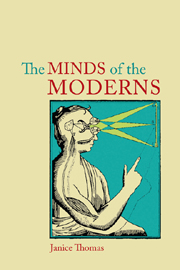Book contents
- Frontmatter
- Contents
- Acknowledgements
- Abbreviations
- Introduction
- I Descartes
- II Spinoza
- 6 Is the mind a substance for Spinoza?
- 7 Spinoza and self-knowledge
- 8 The subject of thought and consciousness
- 9 Spinoza and mental causation
- 10 Spinoza on representation
- III Leibniz
- IV Locke
- V Berkeley
- VI Hume
- Conclusion
- Bibliography
- Index
9 - Spinoza and mental causation
from II - Spinoza
- Frontmatter
- Contents
- Acknowledgements
- Abbreviations
- Introduction
- I Descartes
- II Spinoza
- 6 Is the mind a substance for Spinoza?
- 7 Spinoza and self-knowledge
- 8 The subject of thought and consciousness
- 9 Spinoza and mental causation
- 10 Spinoza on representation
- III Leibniz
- IV Locke
- V Berkeley
- VI Hume
- Conclusion
- Bibliography
- Index
Summary
At some point in each of the preceding chapters it has been said that Spinoza's metaphysical system has no place whatever for the notion of mind-body interaction. Minds are identical with bodies. So, for Spinoza, the suggestion that a mind might be sufficiently separate from its body to exert influence on that body (or vice versa) is a nonsense. This being so, perhaps Spinoza's views on mental causation need not detain us long. The mind, for Spinoza, has no capacity to produce actions or to affect the body in any way.
And yet this is obviously too hasty. For a start, anyone who denies that the mind can produce or influence bodily action owes us an explanation of why human beings have such a strong pre-philosophical conviction that feelings, choices and intentions do indeed have causal power: that mental states cause their possessors to act. We are also owed some account of why, despite popular opinion, the view that mental causation of physical actions is a reality is not just unpersuasive but completely untenable. In what follows the first section will address the question whether Spinoza can successfully explain the folk-psychological belief in mental causation of physical action. The second section will examine Spinoza's case against such mental causation and the third will assess his criticisms of Descartes's account of action and free will.
- Type
- Chapter
- Information
- The Minds of the ModernsRationalism, Empiricism and Philosophy of Mind, pp. 88 - 94Publisher: Acumen PublishingPrint publication year: 2009

